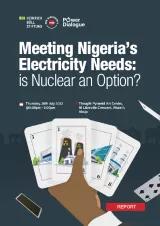Meeting Nigeria's Electricity Needs: Is Nuclear an Option?
Content is no longer being updated
The twin challenge of meeting the rising energy demand of a growing world population while having to decrease the negative impact of energy production on the climate is of global concern. In a bid to tackle its huge electricity deficit and against the backdrop of its recent commitment to net-zero emissions by 2060, Nigeria seeks to build and diversify its energy sources through nuclear power.
In 2015, the federal government began talks with Rosatom, Russia’s state-owned nuclear corporation, to collaborate on designing, constructing, and operating four nuclear power reactors by 2035. In March 2022, the Director General of the Nigerian Nuclear Regulatory Agency announced that the federal government opened bids to construct nuclear power plants to generate 4,000 MW of electricity.
Nigeria’s nuclear power ambitions pose several essential questions: What are some relevant trends in the international nuclear industry, and what are their implications for Nigeria? What is the nature of Nigeria’s power sector challenge, and how would the introduction of nuclear energy help to address the electricity gap? What are the intended next steps and the latest timeline by the government to pursue the roll-out of nuclear power in the country? How does the nuclear option compare to alternative energy pathways in terms of cost, reliability, and ability to combat climate change, considering current global energy trends?
In order to discuss these and related questions, the 72nd Power Dialogue hosted by Nextier Power and sponsored by the Heinrich Böll Foundation invited government representatives, power sector experts, concerned civil society, and the wider public to engage.
The Dialogue took place at a time when nuclear energy is receiving increased government and public attention across the world. Following weeks of controversy, European lawmakers at the beginning of July 2022 voted in favour of a proposal by the European Commission that labels natural gas and nuclear power plants as climate-friendly investments. However, EU member states remain split in their positions. Germany, for example, continues to view nuclear energy as unsustainable, whereas France has announced a vast programme to build as many as 14 new reactors by 2050. The new US climate law also includes tax support for nuclear lifetime extensions and hundreds of millions of dollars for nuclear fusion research.
